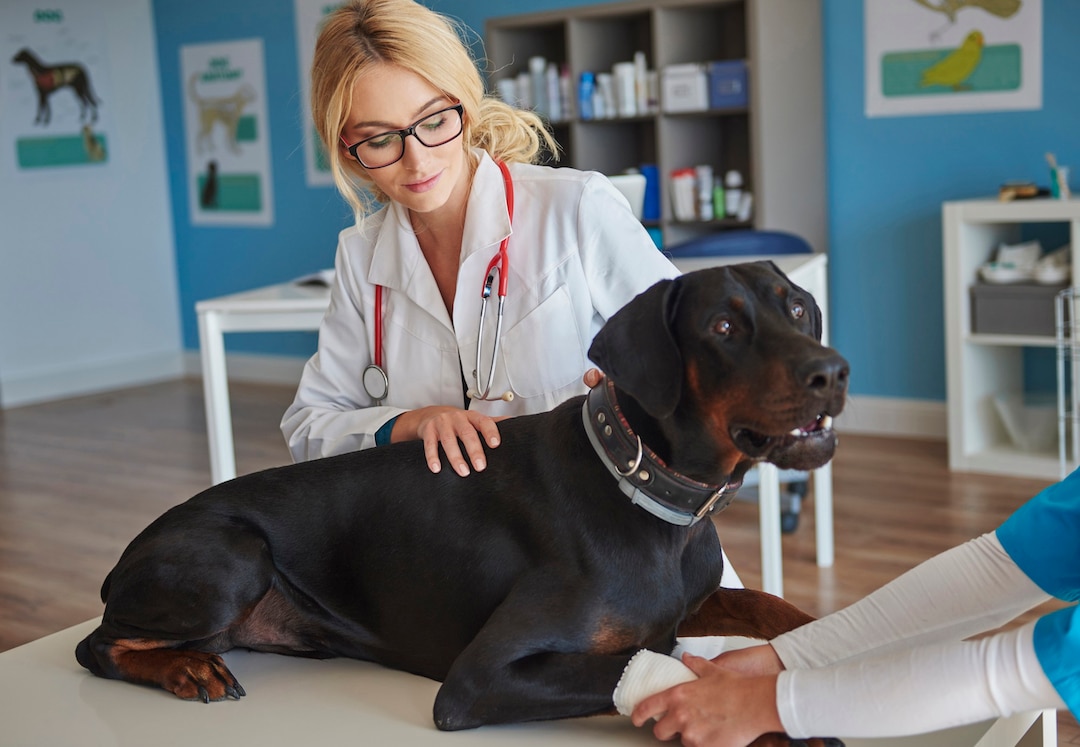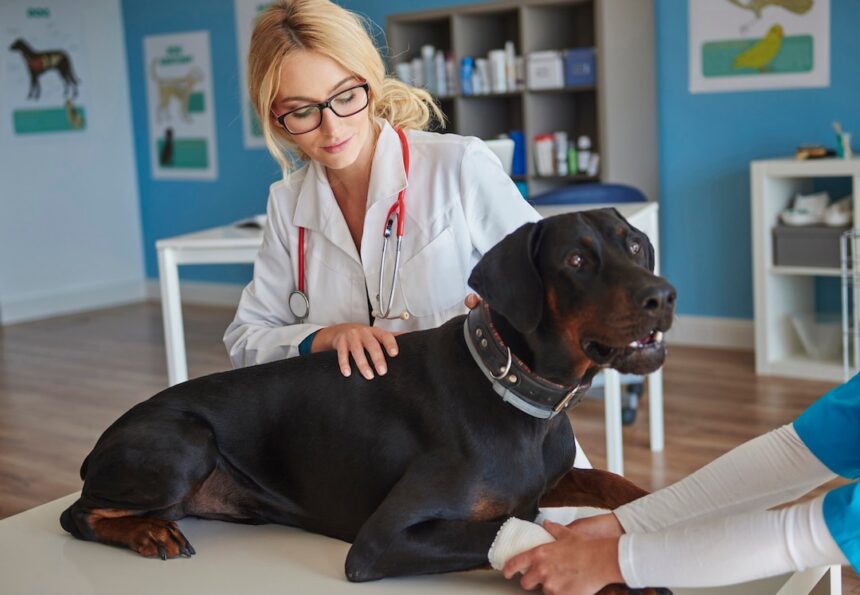Pursuing a Veterinary Career in the USA: A Step-by-Step Guide: If you have a passion for animals and aspire to work as a veterinarian in the United States, it’s essential to understand the steps involved in pursuing this rewarding career. From educational requirements to licensure, this article provides a step-by-step guide on how to secure a veterinarian job in the USA.

Educational Pathway:
To become a veterinarian in the USA, you need to obtain a Doctor of Veterinary Medicine (DVM) degree from an accredited veterinary school. Admission to veterinary programs is highly competitive, and prerequisites typically include a bachelor’s degree with coursework in the sciences. Research various veterinary schools and their admission requirements, including prerequisite courses, GPA expectations, and standardized tests such as the GRE.
Veterinary College Application:
Once you have met the prerequisites, you can apply to accredited veterinary schools through the Veterinary Medical College Application Service (VMCAS). Prepare a strong application package, including transcripts, letters of recommendation, a personal statement, and relevant experience in the field. Be mindful of application deadlines and requirements specific to each school.
DVM Program:
Upon acceptance into a veterinary program, you will embark on a rigorous curriculum that combines classroom instruction, laboratory work, and clinical rotations. The program typically takes four years to complete, with the first three years focusing on coursework and the final year dedicated to clinical rotations in various veterinary specialties.
Veterinary Licensing Examination:
After graduating from a veterinary program, you must pass the North American Veterinary Licensing Examination (NAVLE) to become licensed to practice veterinary medicine in the USA. The NAVLE is a comprehensive examination administered by the National Board of Veterinary Medical Examiners (NBVME) and assesses knowledge and skills necessary for entry-level veterinary practice.
State Licensing and Requirements:
Each state in the USA has its own licensing requirements for veterinarians. Contact the veterinary licensing board in the state where you intend to practice to understand their specific requirements, which may include additional examinations, applications, and fees. Some states also require candidates to complete a jurisprudence examination to ensure familiarity with state-specific laws and regulations.
Foreign Veterinary Graduates:
If you obtained your veterinary degree outside of the USA, you may need to undergo the Educational Commission for Foreign Veterinary Graduates (ECFVG) certification process. The ECFVG evaluates the education and experience of foreign veterinary graduates to determine their eligibility to practice in the USA. The certification process includes examinations and additional requirements specific to each individual’s circumstances.
Gaining Experience:
To enhance your prospects of securing a veterinarian job in the USA, gaining practical experience is invaluable. Seek opportunities for internships, externships, or volunteer work at veterinary clinics, animal shelters, or research institutions. This hands-on experience not only strengthens your skills but also allows you to make professional connections in the field.
Job Search and Networking:
Once you have obtained your veterinary license, embark on a comprehensive job search. Utilize online job boards, veterinary association websites, and professional networking platforms to explore available positions. Attend veterinary conferences, workshops, and local events to network with professionals in the industry. Building connections and establishing relationships can lead to job opportunities and mentorship.
Continuing Education and Specialization:
The field of veterinary medicine is continually evolving, and staying updated with the latest advancements is crucial. Consider pursuing continuing education courses, workshops, and conferences to expand your knowledge and skills. Additionally, you may choose to specialize in a particular area of veterinary medicine by completing a postgraduate residency program and becoming board certified in a specialty.
READ ALSO: A Guide to Applying for Unskilled Jobs in Australia
Additional details to expand on the topic of pursuing a veterinarian job in the USA:
- Specializations in Veterinary Medicine:
Veterinary medicine offers various specialized fields that you can explore based on your interests and career goals. Some popular specialties include veterinary surgery, internal medicine, dermatology, oncology, cardiology, radiology, and ophthalmology. Specializing in a particular area requires completing additional education, such as internships and residencies, and passing specialty board examinations.
- Veterinary Technician and Assistant Roles:
If becoming a veterinarian requires a longer educational pathway than you initially anticipated, or if you would like to gain practical experience in the field before pursuing a DVM degree, you can consider becoming a veterinary technician or assistant. These roles provide hands-on experience in animal care, diagnostics, and treatment under the supervision of a licensed veterinarian. Veterinary technician programs typically require a two-year associate degree, while assistant programs may have shorter durations or on-the-job training options.
- Accreditation and Recognition:
When selecting a veterinary school, ensure that it is accredited by the American Veterinary Medical Association (AVMA). Accreditation ensures that the program meets established standards of quality in veterinary education. Graduating from an accredited veterinary school is essential for obtaining licensure and pursuing professional opportunities in the USA.
- Veterinary Associations and Professional Organizations:
Joining veterinary associations and professional organizations can provide numerous benefits for aspiring and practicing veterinarians. These organizations offer networking opportunities, access to continuing education resources, publications, conferences, and advocacy for the veterinary profession. Examples of prominent veterinary associations in the USA include the American Veterinary Medical Association (AVMA), the American Animal Hospital Association (AAHA), and specialty-specific organizations like the American Association of Equine Practitioners (AAEP) or the American Association of Feline Practitioners (AAFP).
- Externships and Preceptorships:
To gain practical experience and exposure to different veterinary practices, consider participating in externships or preceptorships. These programs allow veterinary students or recent graduates to work alongside experienced veterinarians in various clinical settings. Externships and preceptorships provide invaluable hands-on experience, mentorship opportunities, and a chance to explore different areas of veterinary medicine.
- Continuing Education Requirements:
After obtaining your veterinary license, it is important to stay updated with the latest advancements in the field. Many states require veterinarians to complete continuing education (CE) courses to maintain their licenses. CE requirements vary by state but typically involve a certain number of hours of approved education within a specific time period. Continuing education allows veterinarians to enhance their knowledge, stay current with best practices, and fulfill professional development requirements.
- Veterinary Research and Academia:
If you have a strong interest in research or teaching, pursuing a career in veterinary research or academia may be a viable option. This field involves conducting scientific studies, contributing to advancements in veterinary medicine, and educating future veterinarians. Research positions can be found in academic institutions, government agencies, pharmaceutical companies, and private research organizations.
- Work-Life Balance and Self-Care:
Veterinary medicine can be a demanding and emotionally challenging profession. It is important to prioritize self-care and maintain a healthy work-life balance. Develop strategies to manage stress, seek support from colleagues or professional networks, and engage in activities that promote your well-being. Taking care of yourself ultimately allows you to provide the best care for your patients and maintain long-term career satisfaction.
Remember that the process of pursuing a veterinarian job in the USA may involve additional factors specific to individual circumstances, such as visa requirements for international applicants or state-specific regulations. Therefore, it is essential to research and consult with relevant authorities or professional advisors to ensure you are well-informed and on the right path to achieving your career goals in veterinary medicine.
Inspite of all being Said, Becoming a veterinarian in the USA is a rewarding journey that requires dedication, education, and licensure. By following the steps outlined in this guide, including completing a DVM program, passing licensing examinations, gaining practical experience, and networking within the veterinary community, you can pave the way for a successful career in veterinary medicine. Remember to stay informed about the specific requirements of the state where you plan to practice and embrace lifelong learning to excel in this fulfilling profession.
